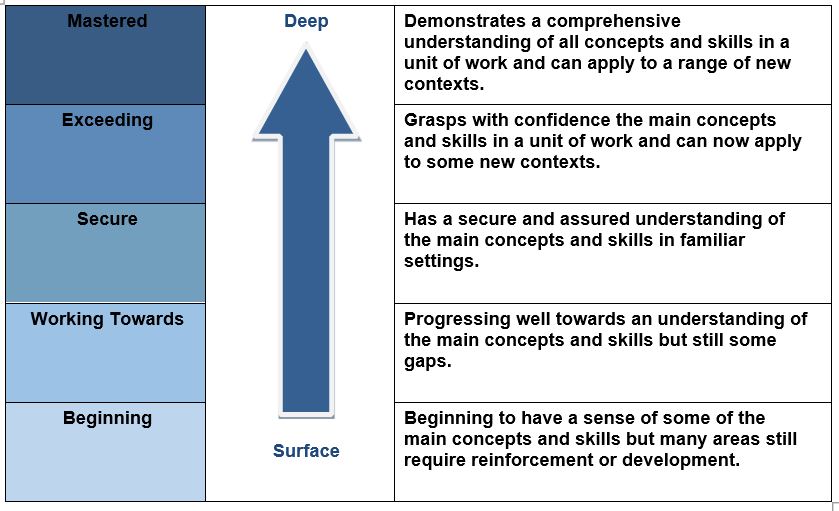The National Curriculum is a ‘mastery’ curriculum. Mastery is your child’s ability to apply their learning across the curriculum. This means, children must MASTER the objectives taught, rather than just be taught them.
In the assessment of each unit of work children are assessed against the National Curriculum objectives. At Heathcote, there are five categories for each stage of their development and these relate to the end of year expectations for English, maths and science.
Language of Assessment
Pupils will be assessed using the following criteria throughout the school year. It is expected that in the Autumn term, the children would be Beginning, in the Spring term the children would be Working Towards or Secure and Summer term the children would be Secure or Exceeding. At the end of the Summer term, we would aim for some children to be Mastered.

It should be noted that the Government does not expect children to be working on the curriculum content from the next year group. Instead, they should be deepening their understanding (mastering) in their own year group and applying their knowledge. Children could be working within the previous year’s National Curriculum. E.g. a Year 4 child could still be working on the Year 3 curriculum objectives.
Standardised scores
For Maths and Reading the tests we have implemented this year also report standardised scores. Age standardised scores convert a pupil’s actual score in a national curriculum test (the ‘raw score’) to a standardised score. This score takes into account the pupil’s age in years and months, giving an indication of how your child is performing relative to other pupils of the same age nationally. We would expect this score to stay fairly stable.
| Below average | Average | Above average | Well above average |
| <100 | 100 | 101-109 | 110> |
Effort Grade Guidance
1 ALWAYS works well in lessons and often takes initiative with work set. ALWAYS completes the work set to the best of his/her ability. ALWAYS stays focussed throughout the lessons. ALWAYS works well with others and ALWAYS has a positive approach to lessons and work set. AWAYS completes homework to a good standard and on time.
2 USUALLY works well in lessons and has taken initiative on many occasions with the work set. USUALLY completes the work set to the best of his/her ability but could extend themselves further. USUALLY works well with others and USUALLY demonstrates a positive attitude to lessons. USUALLY completes homework to a good standard.
3 OFTEN works well in lessons and can take initiative on occasions with the work set. OFTEN completes the work set to the best of his/her ability but leaves out detail or the work is not long enough. OFTEN works well with others but OFTEN tends to wait until teacher asks if they are alright rather than asking for help themselves. OFTEN completes homework to a good standard but has missed some deadlines.
4 SOMETIMES needs reminding to stay on task and may not start working until reminded to do so. SOMETIMES his/her attitude to learning is negative and there are times when he/she does not work well with others. Class and homework is SOMETIMES not completed or not handed in on time and SOMETIMES lacks detail.
5 He/ she SELDOM stays on task. They SELDOM display positivity in class towards others and towards the work set and SELDOM works well with others. Class and homework is SELDOM completed or of a poor standard which does not reflect the child’s ability.
N/A will appear if your child does not attend a particular subject for any reason.